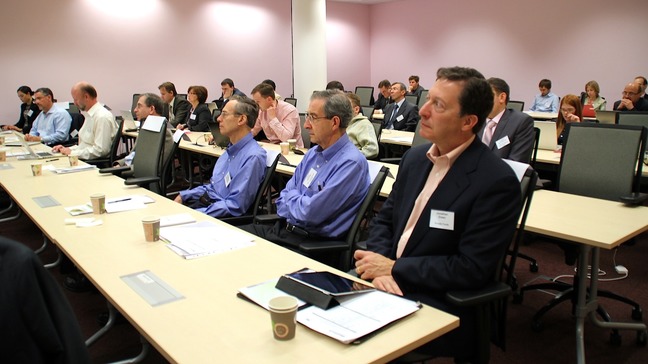From November 13-15, Skoltech hosted the 3rd Skoltech Innovation Program (SIP) Conference to drive university research with consideration of use. The conference brought together researchers, experts in E&I and various technology fields, and industry representatives.
Developed from the Innovation Support Program, which was successfully launched in 2012, SIP is mostly focused on research projects carried at Skoltech and its Centers for Research, Education and Innovation (CREIs).
The Program aims to competitively award translational research funds for one year period to bridge the gap between laboratory and marketplace. To do this, the SIP approach is based on the “Select – Direct – Connect” methodology developed by the Despande Center for Technological Innovation at MIT. Through this method, university research projects are chosen to receive financial support, based on a project’s potential commercial and social impact. Research teams then receive intensive guidance in how to bring their inventions to the marketplace. In particular, SIP helps with establishing proof of concept and advancing the technology towards commercialization, including pre-start up identification of high potential market opportunities, intellectual property management, and, if appropriate, team development.
 Through engagement of Skolkovo partner institutions the Program also aims to contribute to the Russian innovation ecosystem development.
Through engagement of Skolkovo partner institutions the Program also aims to contribute to the Russian innovation ecosystem development.
“The Program is not only about the commercialization, it’s also about the research, approaches to do research, and building connections which might be helpful to advance the technology”, said Igor Seleznev, CEI Director of Research Programs and Technology Transfer, during his address to the conference participants.
Eighteen research teams from nine Russian universities from across the country came to Moscow to present their projects. They included the four projects funded last year and fourteen groups applying for the SIP 2014.
For one year the SIP 2013 participants developed the research projects through collaboration with their Russian and American mentors, so called “catalysts”, who combine deep subject matter knowledge with business experience. During the conference these teams gave presentations on the main outcomes gained from the Program and future development plans. The researchers reported considerable progress in both technology advancement and marketing. The teams achieved patentable results that might be of interest for the industry even at the current stage of product development. One team prototyped a thin film battery for potential application in medical sensors, plastic cards production and other industries.
The SIP participants also said that the Program helped them to obtain new fundamental knowledge on how to bring the scientific research development closer to the market. Four teams have completed the Programs but they will continue collaborating with industrial partners to discuss opportunities for future commercialization. And Skoltech will stay in touch with them to provide support when possible.
The second group of the participants – 14 research teams – were selected from 30 eligible applications that Skoltech had collected after the launch of the call for proposals on October 01, 2013. The research topics varied widely across disciplines and application fields. They included: novel li-conductive polymer membrane for rechargeable lithium batteries; high-power diode lasers with asymmetric barriers; nanopipette electrochemical biosensors; the development of a data processing system and a set of technical solutions to create an intelligent integrated system for urban energy supply; superhydrophobisation of synthetic fabrics, etc.
Each team gave a short presentation and received direct feedback from the review committee consisting of catalysts, Skoltech and MIT representatives, and invited industry and technological innovation experts. The reviewers mostly focused on the novelty, feasibility, overall research merits, likelihood of developing an IP portfolio, market opportunities, and whether the project actually needs any help within the Program.
The reviewers also shared their personal professional experience and gave many ideas on what each particular team should concentrate their efforts on to develop the project.
Following the conference, Skoltech will announce the projects to go in the second selection round and submit the full research proposals. By the end of the year it’s expected that six teams will join the Program.